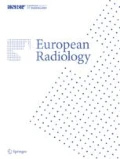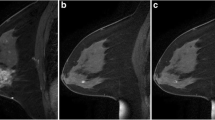Abstract.
The objective of the present study was to monitor response to preoperative chemotherapy with breast MRI in patients with large breast cancer. Fifty-eight women in whom core biopsy had confirmed the presence of breast carcinoma underwent breast MRI prior to beginning chemotherapy and before surgical excision. In 24 cases patients underwent one or two additional examinations during chemotherapy to monitor their progress. Breast MRI included both T2-weighted spin-echo sequences and T1-weighted gradient-echo sequences before and 1, 2, 3, and 8 min after bolus injection of gadolinium-DTPA. Tumor size and the dynamic contrast medium uptake patterns of the respective carcinomas were evaluated and compared with the final histology findings. Based on their MR tomographic findings (change in tumor size and intensity of contrast media uptake), patients were assigned to groups with non-response (NR), partial response (PR), and complete response (CR). Based on MR tomographic findings, there were 12 patients in the NR group, 34 in the PR group, and 12 in the CR group. In NR group contrast medium uptake tended to increase or show no more than minimal decrease. Diagnostic accuracy for assigning patients to the NR group was 83.3% and to the PR group 82.4%. In patients whose tumors showed only slight response to chemotherapy, breast MRI proved very reliable in determining the size of the lesions. In patients whose tumors displayed significant response and in the CR group, the size of the residual tumor was underestimated in 8 of 12 cases. In 66.7% of patients in the CR group histology revealed residual tumor masses in areas up to 5 cm in diameter. During chemotherapy, intensity of contrast medium uptake decreased in 88.2% of patients with PR and in all patients with CR. Reliable determination of response was possible within 6 weeks following the initiation of chemotherapy. Breast MRI is suitable as a monitoring method. The determination of residual tumor size is unreliable in carcinomas exhibiting significant response to chemotherapy which may lead to false-negative results. The method may be employed for monitoring response to chemotherapy after 6 weeks.
Similar content being viewed by others
Author information
Authors and Affiliations
Additional information
Electronic Publication
Rights and permissions
About this article
Cite this article
Rieber, A., Brambs, HJ., Gabelmann, A. et al. Breast MRI for monitoring response of primary breast cancer to neo-adjuvant chemotherapy. Eur Radiol 12, 1711–1719 (2002). https://doi.org/10.1007/s00330-001-1233-x
Received:
Revised:
Accepted:
Published:
Issue Date:
DOI: https://doi.org/10.1007/s00330-001-1233-x




